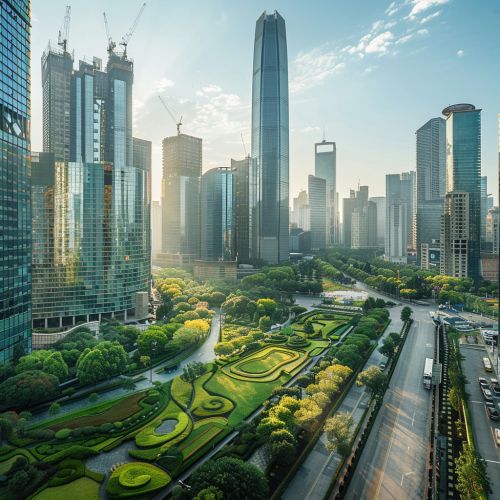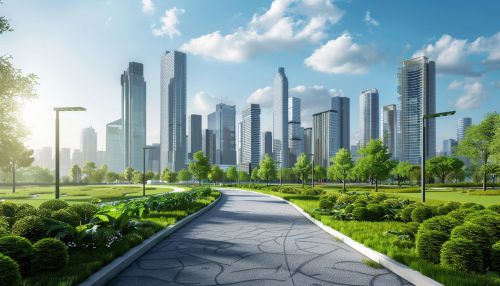Urban Development
Introduction
Urban development refers to the social, cultural, economic, and physical development of cities, as well as the underlying policies and processes that drive this growth. This multifaceted field encompasses a wide range of activities, from the planning and construction of infrastructure to the management of urban spaces and the implementation of policies aimed at improving the quality of life for urban residents. Urban development is a critical area of study and practice, as more than half of the world's population now lives in urban areas, a figure that is expected to continue rising in the coming decades.
Historical Context
Urban development has a long history, dating back to the earliest human settlements. Ancient cities such as Uruk and Thebes were among the first to exhibit characteristics of urban development, including complex social structures, specialized labor, and monumental architecture. The Industrial Revolution marked a significant turning point in urban development, leading to rapid urbanization and the growth of modern cities. This period saw the emergence of new technologies and transportation systems, which facilitated the expansion of urban areas and the concentration of populations in cities.
Theories of Urban Development
Several theories have been proposed to explain the processes and patterns of urban development. These theories can be broadly categorized into economic, sociological, and ecological perspectives.
Economic Theories
Economic theories of urban development focus on the role of economic factors in shaping cities. The Central Place Theory, developed by Walter Christaller, posits that cities serve as central places that provide goods and services to surrounding areas. The Bid-Rent Theory suggests that land values and land use patterns are determined by the distance from the central business district, with land closer to the center being more valuable and used for more intensive purposes.
Sociological Theories
Sociological theories emphasize the social and cultural dimensions of urban development. The Chicago School of Sociology proposed several influential theories, including the Concentric Zone Model, which describes the spatial organization of cities in concentric rings, and the Sector Model, which suggests that cities develop in sectors radiating out from the center. These theories highlight the role of social processes, such as migration and segregation, in shaping urban form.
Ecological Theories
Ecological theories of urban development draw on concepts from ecology to explain the growth and organization of cities. The Urban Ecology approach views cities as ecosystems, with interactions between human and environmental factors shaping urban development. This perspective emphasizes the importance of sustainability and the need to balance economic, social, and environmental goals in urban planning.
Urban Planning and Policy
Urban planning and policy play a crucial role in guiding urban development. Urban planners use a variety of tools and techniques to design and manage urban spaces, including zoning regulations, land-use planning, and transportation planning. Effective urban planning requires a comprehensive understanding of the social, economic, and environmental factors that influence urban development.
Zoning Regulations
Zoning regulations are a key tool used by urban planners to control land use and development. These regulations divide cities into different zones, each with specific rules governing the types of activities that can take place and the intensity of development. Zoning can help to ensure that incompatible land uses are separated, promote orderly growth, and protect the character of residential neighborhoods.
Land-Use Planning
Land-use planning involves the systematic assessment and allocation of land for different purposes, such as residential, commercial, industrial, and recreational uses. This process aims to optimize the use of land resources, promote sustainable development, and enhance the quality of life for urban residents. Land-use planning often involves public participation and consultation to ensure that the needs and preferences of the community are taken into account.
Transportation Planning
Transportation planning is a critical component of urban development, as it determines the layout and efficiency of transportation networks within cities. Effective transportation planning can reduce traffic congestion, improve accessibility, and promote the use of public transportation. This, in turn, can have significant benefits for the environment and public health by reducing air pollution and encouraging active modes of transportation, such as walking and cycling.


Challenges in Urban Development
Urban development faces a range of challenges, including rapid urbanization, environmental degradation, social inequality, and economic instability. Addressing these challenges requires innovative solutions and collaborative efforts from governments, private sector stakeholders, and civil society.
Rapid Urbanization
Rapid urbanization is one of the most pressing challenges in urban development. As more people move to cities in search of better opportunities, urban areas are experiencing unprecedented growth. This can lead to overcrowding, strain on infrastructure and services, and the proliferation of informal settlements or slums. Managing rapid urbanization requires effective planning and investment in infrastructure, housing, and services to accommodate growing populations.
Environmental Degradation
Urban development can have significant environmental impacts, including air and water pollution, loss of green spaces, and increased greenhouse gas emissions. Sustainable urban development aims to minimize these impacts by promoting environmentally friendly practices, such as green building design, renewable energy use, and the preservation of natural habitats. Urban planners must balance the need for development with the imperative to protect the environment and ensure the long-term sustainability of cities.
Social Inequality
Social inequality is a major challenge in urban development, with disparities in income, access to services, and quality of life often more pronounced in urban areas. Addressing social inequality requires policies and programs that promote inclusive development, such as affordable housing initiatives, equitable access to education and healthcare, and measures to reduce poverty and unemployment. Ensuring that all residents benefit from urban development is essential for creating just and equitable cities.
Economic Instability
Economic instability can pose significant challenges to urban development, particularly in the context of global economic fluctuations and crises. Cities that are heavily reliant on specific industries or sectors may be vulnerable to economic downturns, which can lead to job losses, reduced investment, and declining living standards. Diversifying the urban economy and promoting resilience through strategic planning and investment can help mitigate the impacts of economic instability.
Innovations in Urban Development
Innovations in urban development are transforming the way cities are designed, built, and managed. Advances in technology, new planning approaches, and innovative policy solutions are helping to address the challenges of urbanization and create more sustainable, livable cities.
Smart Cities
The concept of Smart Cities involves the use of digital technologies and data analytics to improve the efficiency and effectiveness of urban services and infrastructure. Smart city initiatives can enhance transportation systems, energy management, public safety, and citizen engagement. By leveraging technology, smart cities aim to create more responsive, adaptive, and sustainable urban environments.
Green Infrastructure
Green infrastructure refers to the use of natural systems and processes to manage urban water, reduce pollution, and enhance the quality of urban environments. Examples of green infrastructure include green roofs, permeable pavements, urban forests, and wetlands. These solutions can provide multiple benefits, such as reducing the urban heat island effect, improving air quality, and increasing biodiversity.
Participatory Planning
Participatory planning involves engaging citizens in the decision-making processes that shape urban development. This approach recognizes the importance of local knowledge and the need for inclusive and democratic planning practices. Participatory planning can take various forms, including public consultations, workshops, and collaborative design processes. By involving residents in planning decisions, cities can create more responsive and equitable urban environments.
Case Studies
Examining case studies of urban development can provide valuable insights into the successes and challenges of different approaches. The following examples highlight innovative and effective urban development practices from around the world.
Curitiba, Brazil
Curitiba is renowned for its innovative urban planning and sustainable development practices. The city's Bus Rapid Transit (BRT) system, implemented in the 1970s, has become a model for efficient and affordable public transportation. Curitiba's integrated approach to urban planning, which includes green spaces, mixed-use development, and community participation, has contributed to its reputation as a leading example of sustainable urban development.
Copenhagen, Denmark
Copenhagen is widely recognized for its commitment to sustainability and quality of life. The city's comprehensive cycling infrastructure, extensive public transportation network, and focus on green building design have made it one of the most livable cities in the world. Copenhagen's ambitious goal to become carbon-neutral by 2025 demonstrates its leadership in addressing climate change and promoting sustainable urban development.
Singapore
Singapore's approach to urban development is characterized by its emphasis on efficiency, innovation, and sustainability. The city-state's land-use planning, public housing programs, and investment in technology have enabled it to accommodate a growing population while maintaining high standards of living. Singapore's Marina Bay development, which integrates commercial, residential, and recreational spaces, exemplifies its holistic approach to urban planning.
Future Trends in Urban Development
The future of urban development will be shaped by emerging trends and challenges, including technological advancements, demographic shifts, and environmental concerns. Anticipating and responding to these trends will be essential for creating resilient and sustainable cities.
Technological Advancements
Technological advancements, such as Artificial Intelligence (AI), Internet of Things (IoT), and Blockchain, are poised to revolutionize urban development. These technologies can enhance the efficiency of urban services, improve data-driven decision-making, and enable new forms of citizen engagement. Cities that embrace technological innovation will be better equipped to address the complex challenges of urbanization.
Demographic Shifts
Demographic shifts, such as population aging, migration, and changing household structures, will have significant implications for urban development. Cities will need to adapt to these changes by providing appropriate housing, services, and infrastructure for diverse populations. Planning for demographic shifts will require a flexible and inclusive approach to urban development.
Environmental Concerns
Environmental concerns, including climate change, resource depletion, and biodiversity loss, will continue to be major drivers of urban development. Cities will need to adopt sustainable practices and policies to mitigate environmental impacts and enhance resilience. This will involve integrating green infrastructure, promoting renewable energy, and prioritizing sustainable transportation.
Conclusion
Urban development is a complex and dynamic field that encompasses a wide range of activities, theories, and challenges. As cities continue to grow and evolve, effective urban planning and policy will be essential for creating sustainable, livable, and equitable urban environments. By embracing innovation, promoting inclusivity, and addressing environmental concerns, cities can navigate the challenges of urbanization and build a better future for all residents.
